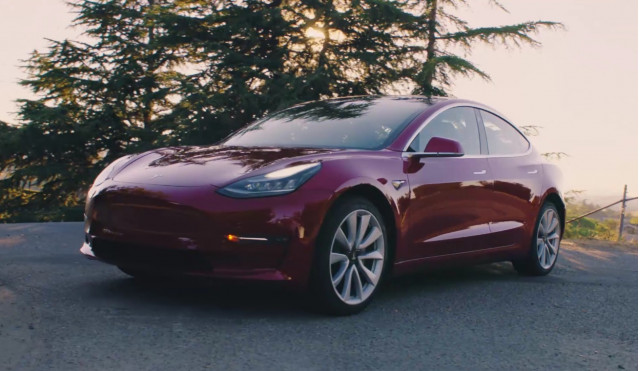2017 Tesla Model 3, in photo tweeted by Elon Musk on July 9, 2017
Late Friday evening, Tesla announced an executive reshuffling after a month or more of chaos within the company.
The blog posted to the company's website from CEO Elon Musk on Friday announced that the automaker appointed Jerome Guillen president of automotive operations. Guillen, whom Musk says was a key player in the construction of an additional Model 3 assembly line in a tent adjacent to the factory, will report directly to Musk and oversee all automotive and supply chain operations. His responsibilities could include the types of things analysts have said Musk needs a COO to do in running the day-to-day operations of the company.
Kevin Kassekert, who led the construction of the Gigafactory, has been promoted to “VP of People and Places”, which includes HR and facilities. Chris Lister will take his place as VP of Gigafactory Operations.
Felicia Mayo, an HR director, has been promoted to VP, along with Laurie Shelby, in charge of environmental health and safety and Cindy Nicola, in charge of recruiting.
Dave Arnold, who has worked in Tesla communications for several months, has been promoted to senior director of the department.
The move came a day after Musk appeared in a live webcast with entertainment host Joe Rogan in an interview that some deemed self-destructive and out of control. It was also a month after the CEO announced on Twitter that he had “funding secured” for a plan to take Tesla private, then rescinded the plan two weeks later.
Analysts have since called for Musk to take a leave of absence or step down.
DON'T MISS: Tesla's CEO Elon Musk announces company will stay public, abandons private push
It's not clear whether the reshuffling of executives goes quite that far, but it does address a vacuum that had been developing at the top of the company as several top executives have recently left.
On Tuesday, Chief Accounting Officer Dave Morton quit less than a month after taking the job; he started the day before Musk's privatization tweet.
“Since I joined Tesla on August 6th, the level of public attention placed on the company, as well as the pace within the company, have exceeded my expectations,” Morton said in his resignation letter. “This caused me to reconsider my future. I want to be clear that I believe strongly in Tesla, its mission, and its future prospects, and I have no disagreements with Tesla’s leadership or its financial reporting.”
The SEC reportedly launched an investigation into Musk's tweet, and investors have launched at least two lawsuits, including one on Thursday, according to The Associated Press.
READ THIS: Report: SEC investigating Musk tweet about taking Tesla private
On Friday, the head of Tesla's Human Resources department, Gabrielle Toledano, announced she would not return from a leave scheduled in June. The company has been embroiled in at least two whistleblower cases at its Gigafactory that former employees allege it mishandled materials, didn't investigate theft, and allowed a drug dealer to operate. Employees at both its Fremont, California, car factory and Reno, Nevada, battery Gigafactory, have been in “production hell,” according to Musk, working to ramp up production of the company's critical Model 3 sedan.
Tesla Model 3 all-wheel drive Performance rolls off a new assembly line in a temporary structure
Two weeks ago VP of Communications Sarah O'Brien also announced her resignation.
All three positions play critical roles in advising the CEO on interactions with employees, the public, and regulators, three areas where Musk's behavior has been publicly called into question in the past two months.

